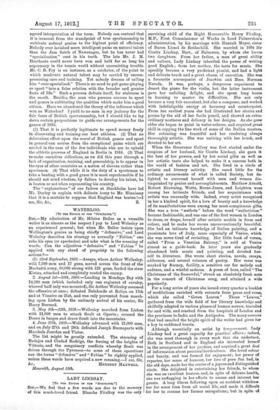WATERLOO.
[To TER EDITOR OF TER "SPECTATOR."]
Sin,—My admiration of Mr. Hilaire Belloo as a versatile writer is as sincere as the respect I pay to Lord Wolseley as an experienced general; but when Mr. Belles insists upon Wellington's genius as being chiefly " defensive," and Lord Wolseley describes his strategy as normally " Fabian," one rubs his eyes (or spectacles) and asks what is the meaning of words. Can the adjectives " defensive " and "Fabian " be applied with any shred of propriety to the following actions (1) 23rd September, 1803.—Assaye, where Arthur Wellesley, with 7,500 men and 17 guns, moved across the front of the Marhattl army, 50,000 strong with 128 guns, forded the river Kistna, attacked and completely routed the enemy.
2. August tat-20th, 1808.—Landing in Mondego Bay with 14,200 men (which included only one regiment of cavalry, whereof half only was mounted), Sir Arthur Wellesley assumed the offensive at once ; defeated Delaborde at Rolica on 17th and at Vimeiro on 21st, and was only prevented from march- ing upon Lisbon by the untimely arrival of his senior, Sir Harry Burrard.
3. May 5th-12th, 1809.—Wellesley marched from Lisbon with 21,000 men to attack Soult at Oporto ; crossed the Douro in barges and drove Soult into the mountains.
4. June 27th, 1809.—Wellesley advanced with 21,000 men, and on July 27th and 28th defeated Joseph Buonaparte with Marshals Jourdan and Victor.
' The list might be greatly extended. The storming of Badajos and Ciudad Rodrigo, the forcing of the heights of Vittoria, and the sanguinary conflicts whereby Soult was driven through the Pyrenees—to none of these operations can the terms " defensive" and " Fabian " be rightly applied, unless these words have acquired a new meaning.—I am, Sir,






































 Previous page
Previous page